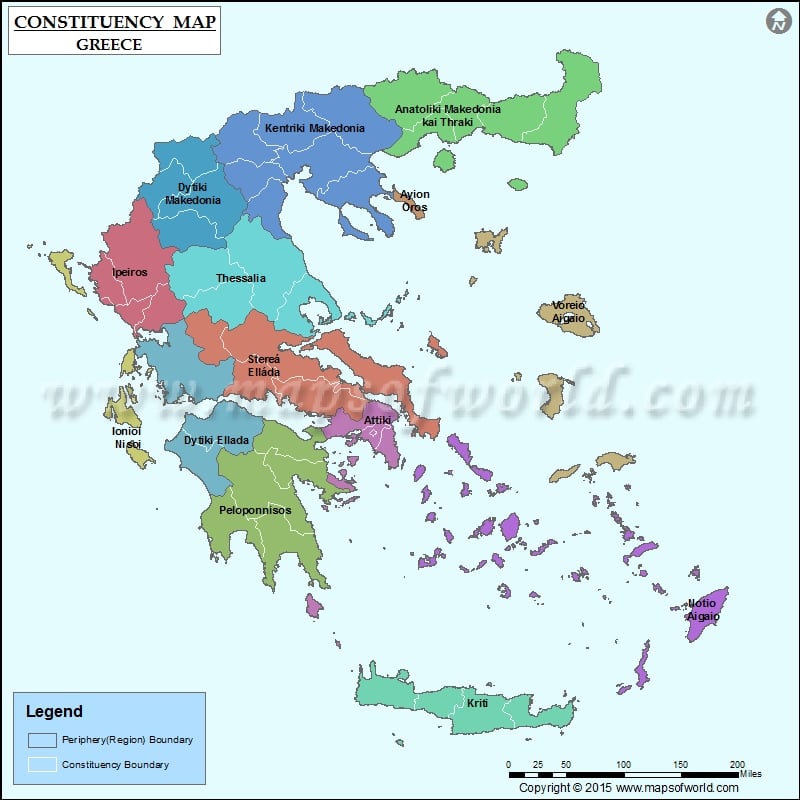Elections in Greece 2015

| Party | Vote | Seats | |||
|---|---|---|---|---|---|
| Votes | % | ±pp | Won | +/− | |
| Coalition of the Radical Left (SYRIZA) | 1.920.538 | 35.47 | 0.87 | 145 | 4 |
| New Democracy (ND) | 1.521.062 | 28.09 | 0.28 | 75 | 1 |
| Popular Association-Golden Dawn (ΧΑ) | 378.682 | 6.99 | 0.71 | 18 | 1 |
| Democratic Coalition (PASOK-DIMAR)[a] | 340.089 | 6.28 | 1.12 | 17 | 4 |
| Know More… | |||||
Legislative Election in Greece will take place on 25 January 2015 to choose 300 members for the Hellenic Parliament. The political scenario is polarized between pro and anti-bailout groups that have participated in intense political debate on the proposed economic bailout package that Greece requires to save its economy from collapsing.
Election System
The parliament of Greek consists of 300 members elected for a period of four years following a process of “reinforced proportional representation” in 56 constituencies. Out of 56 constituencies, 8 are single-seat and 48 are multi-seat. Constituency voting determines the number of seats and voters may vote for the candidate or candidates by punching their names on their respective party ballot.
However, the party that receives the highest number of votes wins a premium of 50 seats that are filled by the party candidates, not declared selected for the lower rungs.
Election History
In June 2012, New Democracy formed the government with outside support from Panhellenic Socialist Movement (PASOK) and Democratic Left (DIMAR). In June 2013, Antonis Samaras-led New Democracy government took a unilateral decision to shut Hellenic Broadcasting Corporation, the state television broadcaster, without consulting its coalition partners. DIMAR withdrew its support to the government, in protest against the move. Ever since, the government has been running on the brink of losing majority.
On 08 December 2014, Antonis Samaras announced the Presidential elections would be brought forward and the first, second, and third rounds of elections were announced on 17, 23 and 29 December 2014, respectively.
After three rounds, no party was able to achieve the mandated majority, hence snap polls were held on 25 January 2015.The current opinion polls show strong anti-incumbency against the ruling New Democracy and greater support for the left leaning SYRIZA party. The latest move by the former Prime Minister George Papandreou to split from the centre-left PASOK, a party founded by his father, to form his own party, Movement for Change, has further complicated an already fractured political environment. His departure further weakens PASOK. According to the latest polls, PASOK is down to a mere 5 per cent after dominating Greek politics for over 40 years.
Economic Crisis and the elections
Greece has been going through an economic depression since 2008 and was forced to seek two rounds of economic bailout packages from the European Union. Both rounds of funding failed to bring the economy back on rails and the crisis continued due to lack of political consensus between various political parties.
By October 2013, the European Central Bank (ECB) stated that the current economic situation warrants another round of bailout funding and the EU led by Germany has been pressurizing Greece for raising additional resources by raising taxes and shutting down of non-productive public sector units. There is widespread resistance from the labor unions and public in general, against any further increase in taxes or cuts in jobs.
The world awaits poll outcome
These elections are very significant as it was the Greek crisis that initiated a global collapse four years ago. This time too, the outcome will be watched carefully by the world, as an unstable Greek government will further complicate the European economy, which is struggling to cope with recession and also deal with the emerging Russian situation.
Political Parties
The ruling party, New Democratic led by Antonis Samaras holds the maximum 131 seats in parliament, followed by Alexis Tsipras-led Coalition of the Radical Left (SYRIZA) with 71 seats, Evangelos Venizelos led PASOK with 24 seats, amongst other smaller parties. The Constitution mandates holding half plus one seats to form government, which means the target majority number is 151 out of a total of 300 seats.
Brief Bio of Candidates
Antonis Samaras: Leader of New Democracy, Antonis Samaras is a Greek politician who has been ruling since 2012 as the Prime Minister of Greece. Previously, he has served as the Finance Minister (1989), Minister of Foreign Affairs (1989-92), and Minister of Culture and Sport (2009).
Alexis Tsipras: He is also a Greek politician and presently, the Leader of the Coalition of the Radical Left (SYRIZA) and Leader of the Opposition. In 2009, he was first chosen for the Hellenic Parliament and in the 2014 European Parliament Election, he was the nominee for President of the European Commission for the party of the European Left.
Evangelos Venizelos: Another Greek Politician, Venizelos has been Minister for Foreign Affairs and Deputy Prime Minister who since 25 June 2013. He is, currently, a member of the Hellenic Parliament for the first electoral constituency in Thessaloniki for the Panhellenic Socialist Movement (PASOK).